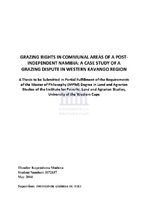| dc.contributor.advisor | Du Toit, Andries | |
| dc.contributor.author | Muduva, Theodor Kupembona | |
| dc.date.accessioned | 2015-05-05T10:24:40Z | |
| dc.date.available | 2015-05-05T10:24:40Z | |
| dc.date.issued | 2014 | |
| dc.identifier.uri | http://hdl.handle.net/11394/4108 | |
| dc.description | Magister Philosophiae (Land and Agrarian Studies) - MPhil(LAS) | en_US |
| dc.description.abstract | This dissertation aims at understanding the legal implications of a grazing dispute that was reported in the western Kavango Region a few years after Namibia’s Independence in 1990. This dispute which was between Ovawambo cattle owners and herders from the Ohangwena and Oshikoto regions and the local Vakwangali community members (represented by the UKTA) was reported in 1992 (other reports suggest that it might even have originated as early as the 1960s and 1980s), when it was said that the Ovawambo cattle owners and herders with their hundreds of cattle had entered into western Kavango “illegally” in search of grazing. The Ovawambo cattle owners and herders were first charged in 2005 and were eventually evicted in 2009. This dissertation looks at how legislation was used to deal with the conflict and investigates the impacts of the court order on all parties involved. The methodology employed during this study was predominantly qualitative, mainly utilising individual interviews and focus group discussions with the participants. This study found that the Government of Namibia had delayed acting on the grazing dispute for mainly political reasons. The study also found that many herders had indeed entered western Kavango Region illegally because they could not provide any letters of consent from the Ukwangali Traditional Authority (UKTA); many herders also admitted that there were no written agreements between themselves and the UKTA. The research also found that although the eviction orders were issued to all the herders, some still remained in the area; this selective application of the law rendered the eviction order somewhat ineffective. The study found that some local or affected community members were satisfied with the consequences of the eviction order and reported positive results regarding their farming activities such as better grazing and improved yields in their crop fields. Other community members, however, were disappointed by the refusal of certain herders to vacate the area, as well as by the failure of the government to ensure that all the herders had left the area. | en_US |
| dc.language.iso | en | en_US |
| dc.publisher | University of the Western Cape | en_US |
| dc.subject | Grazing rights | en_US |
| dc.subject | Communal areas | en_US |
| dc.subject | Grazing dispute | en_US |
| dc.subject | Namibia | en_US |
| dc.title | Grazing rights in communal areas of a post-independent Namibia: a case study of a grazing dispute in western Kavango region | en_US |
| dc.type | Thesis | en_US |
| dc.rights.holder | University of the Western Cape | en_US |

